2012届高考英语实战演练专题阅读理解(1----40)
- 格式:doc
- 大小:298.50 KB
- 文档页数:18
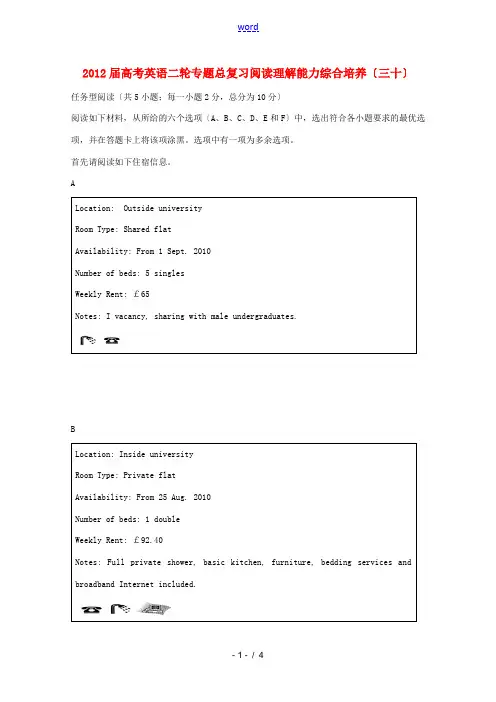
2012届高考英语二轮专题总复习阅读理解能力综合培养〔三十〕任务型阅读〔共5小题;每一小题2分,总分为10分〕阅读如下材料,从所给的六个选项〔A、B、C、D、E和F〕中,选出符合各小题要求的最优选项,并在答题卡上将该项涂黑。
选项中有一项为多余选项。
首先请阅读如下住宿信息。
ABLocation: Outside universityRoom Type: Shared flatAvailability: From 1 Sept. 2010Number of beds: 5 singlesWeekly Rent: £65Notes: I vacancy, sharing with male undergraduates.Location: Inside universityRoom Type: Private flatAvailability: From 25 Aug. 2010Number of beds: 1 doubleWeekly Rent: £92.40Notes: Full private shower, basic kitchen, furniture, bedding services and broadband Internet included.CDLocation: Inside universityRoom Type: Standard with washbasinAvailability: From 25 Sept. 2010Number of beds:1 singleWeekly Rent:£70.00Notes: Private single bedroom. Also has public kitchen, bathrooms, WC and relaxing area with sofas that are shared by around 15 people.ELocation: Outside universityRoom Type: Private flatAvailability: From 1 Apr.2010Number of beds:2 doublesWeekly Rent:£15.00Notes: 1 double bedroom with lounge, kitchen, bathroom and WC. Sofa bed in lounge can be used as a second double bed. Includes free broadband Internet.Location: Inside universityRoom Type: Townhouse flatsAvailability: From 25 Sept.2010Number of beds:12 singlesWeekly Rent:£35.00Notes: 12 people share each house. These are brand new for 2008, and each house contains a good size public kitchen, living area with sofas and downstairs laundry.F请阅读如下师生的信息,然后匹配与其需求相对应的住宿信息。
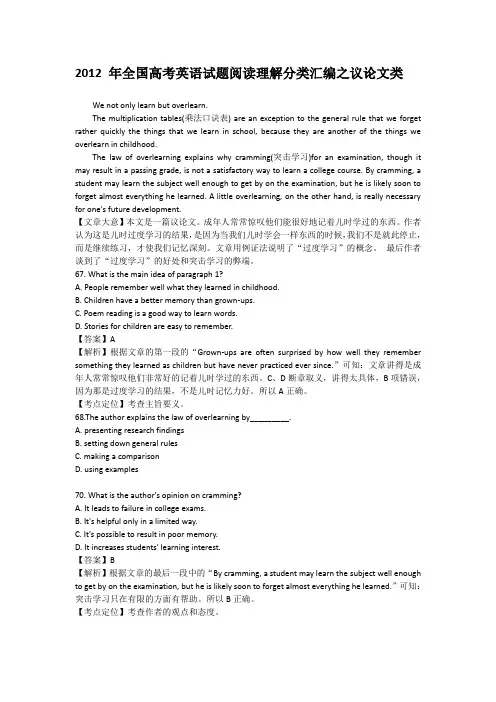
2012 年全国高考英语试题阅读理解分类汇编之议论文类We not only learn but overlearn.The multiplication tables(乘法口诀表) are an exception to the general rule that we forget rather quickly the things that we learn in school, because they are another of the things we overlearn in childhood.The law of overlearning explains why cramming(突击学习)for an examination, though it may result in a passing grade, is not a satisfactory way to learn a college course. By cramming, a student may learn the subject well enough to get by on the examination, but he is likely soon to forget almost everything he learned. A little overlearning, on the other hand, is really necessary for one's future development.【文章大意】本文是一篇议论文。
成年人常常惊叹他们能很好地记着儿时学过的东西。
作者认为这是儿时过度学习的结果,是因为当我们儿时学会一样东西的时候,我们不是就此停止,而是继续练习,才使我们记忆深刻。
文章用例证法说明了“过度学习”的概念。
最后作者谈到了“过度学习”的好处和突击学习的弊端。
67. What is the main idea of paragraph 1?A. People remember well what they learned in childhood.B. Children have a better memory than grown-ups.C. Poem reading is a good way to learn words.D. Stories for children are easy to remember.【答案】A【解析】根据文章的第一段的“Grown-ups are often surprised by how well they remember something they learned as children but have never practiced ever since.”可知:文章讲得是成年人常常惊叹他们非常好的记着儿时学过的东西。
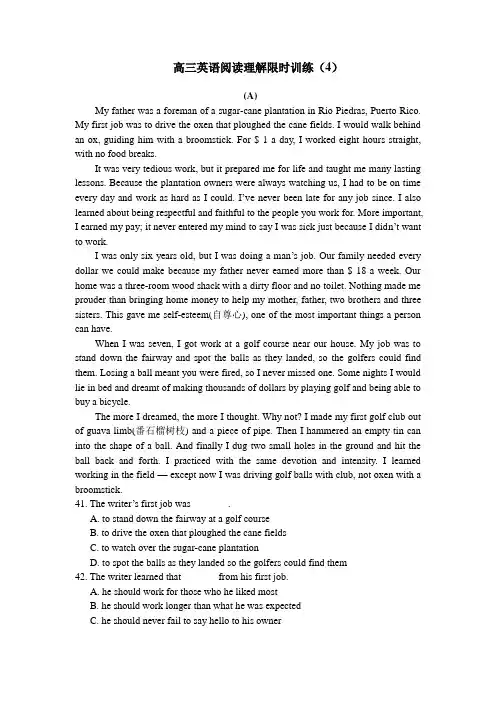
高三英语阅读理解限时训练(4)(A)My father was a foreman of a sugar-cane plantation in Rio Piedras, Puerto Rico. My first job was to drive the oxen that ploughed the cane fields. I would walk behind an ox, guiding him with a broomstick. For $ 1 a day, I worked eight hours straight, with no food breaks.It was very tedious work, but it prepared me for life and taught me many lasting lessons. Because the plantation owners were always watching us, I had to be on time every day and work as hard as I could. I’ve never been late for any job since. I also learned about being respectful and faithful to the people you work for. More important, I earned my pay; it never entered my mind to say I was sick just because I didn’t want to work.I was only six years old, but I was doing a man’s job. Our family needed every dollar we could make because my father never earned more than $ 18 a week. Our home was a three-room wood shack with a dirty floor and no toilet. Nothing made me prouder than bringing home money to help my mother, father, two brothers and three sisters. This gave me self-esteem(自尊心), one of the most important things a person can have.When I was seven, I got work at a golf course near our house. My job was to stand down the fairway and spot the balls as they landed, so the golfers could find them. Losing a ball meant you were fired, so I never missed one. Some nights I would lie in bed and dreamt of making thousands of dollars by playing golf and being able to buy a bicycle.The more I dreamed, the more I thought. Why not? I made my first golf club out of guava limb(番石榴树枝) and a piece of pipe. Then I hammered an empty tin can into the shape of a ball. And finally I dug two small holes in the ground and hit the ball back and forth. I practiced with the same devotion and intensity. I learned working in the field — except now I was driving golf balls with club, not oxen with a broomstick.41. The writer’s first job was _______.A. to stand down the fairway at a golf courseB. to drive the oxen that ploughed the cane fieldsC. to watch over the sugar-cane plantationD. to spot the balls as they landed so the golfers could find them42. The writer learned that_______ from his first job.A. he should work for those who he liked mostB. he should work longer than what he was expectedC. he should never fail to say hello to his ownerD. he should be respectful and faithful to the people he worked for43. _______ gave the writer self-esteem.A. Having a family of eight peopleB. Owning his own golf courseC. Bringing money back home to help the familyD. Helping his father with the work on the plantation44. Which of the following statements is true according to the passage?A. He wanted to be a successful golfer.B. He wanted to run a golf course near his house.C. He was satisfied with the job he got on a plantation.D. He wanted to make money by guiding oxen with a broomstick.(B)You’re out to dinner. The food is delicious and the service is fine. You decide to leave a big fat tip. Why? The answer may not be as simple as you think.Tipping, psychologists have found, is not just about service. Instead, studies have shown that tipping can be affected by psychological reactions to a series of different factors from the waiter’s choice of words, to how they carry themselves while taking orders, to the bill’s total. Even how much waiters remind customers of themselves can determine how much change they pocket by the end of the night.“Studies before have shown that mimicry (模仿) brings into positive feelings for the mimicker,” wrote Rick van Baaren, a social psychology professor. “These studies show that people who are being mimicked become more generous toward the person who mimics them.”So Rick van Baaren divided 59 waiters into two groups. He requested that half serve with a phrase such as, “Coming up!” Those in the other half were instructed to repeat the orders and preferences back to the customers. Rick van Baaren then compared their take-home. The results were clear — it pays to mimic your customer. The copycat(模仿者) waiters earned almost double the amount of tips to the other group.Leonard Green and Joel Myerson, psychologists at Washington University in St. Louis, found the generosity of a tipper may be limited by his bill. After research on the 1,000 tips left for waiters, cabdrivers, hair stylists, they found tip percentages in these three areas dropped as customers’ bills went up. In fact, tip percentages appear to plateau (达到稳定水平) when bills topped $100 and a bill for $200 made the worker gain no bigger percentage tip than a bill for $100.“That’s also a point of tipping,” Green says. “Y ou have to give a little extra to the cab driver for being there to pick you up and something to the waiter for being there to serve you. If they weren’t there, you’d never get any service. So part of the idea of a tip is for just being there.”45. Apart from service, how many other factors affecting the customers’ tipping arementioned in the passage?A. 1.B. 2.C. 3.D. 4.46. These studies show that _________.A. tipping can be affected by physical reactions to many different waiter ’s factorsB. people who are being mimicked usually tip less to the person who mimics themC. the mimic waiters can get almost twice as much money as the other groupD. mimicry makes the mimicker feel bad47. According to the passage, which of the following will be likely to show the rightchange of the tip percentages?A B CD48. We know from the passage that the writer seems to __________.A. object to Mr. Green ’s idea about tippingB. think part of Mr. Green ’s explanation is reasonableC. give his generous tip to waiters very oftenD. support the opinions of Mr. Green and Rick van Baaren about tipping(C)49. If you happen to be the 200th customer to buy Cholesterolblock, youwill .50 100 150 50 100 150 50 100 150 50 100 150A. be able to buy it at a low priceB. be the luckiest one onlineC. try it free of chargeD. change your diet50. Liptor®, Zocor®, Crestor® are .A. diseasesB. side effectsC. medicinesD.cholesterol51. Cholestrolblock TM has the following advantages EXCEPT that_____________________.A. it helps take cholesterol out of whatever food you eat.B. it has been proved useful in hospital testing.C. it helps people absorb at least 42% cholesterol.D. it sells best on Internet every month.52. Where can you most probably read this passage?A.In a travel guide book. B.On a university bulletin board.C.In a health magazine. D.In a doctor's prescription.(D)Have you ever listened to young children talking in the playground? They are always boasting. They say things like, “My Dad’s car is bigger than your Dad’s,” and “My Mom is smarter than yours.” They particularly like to boast about their families.There were three little boys, Harry, Ted and Gavin, who were always boasting. Gavin was the worst. Everything about his family was always the best or the biggest or the most expensive.Whatever the others said, he could always go on better. One day when they were walking to school, Harry said, “My father had a bath twice a week,” Ted spoke next. “That’s nothing,” he said. “Having a bath twice a week is dirty. My father has a bath every day, sometimes twice a day.”Ted looked at Gavin. Now it was his turn. But what could he say? “This time,” Ted thought, “I’m going to win.” Gavin didn’t know what to say. He couldn’t say that his father had a bath three times a day. That was silly. He walked on in silence. Ted smiled at Harry, and Harry smiled back. They were sure that for once they had beaten Gavin. They reached the school gates. Still Gavin said nothing. “We’ve won,” Ted said to Harry, but he spoke too soon. On the way home, Gavin said, “My Dad is so clean that he doesn’t have to bathe at all.”53. According to the passage, the meaning of the word “boast” is __________.A. to sing a nice songB. to talk bigC. to go on betterD. to have a bath three times a day54. What did Harry boast about?A. The number of times his father had a bath every week.B. The size of the bathroom in his home.C. His father’s car.D. His mother’s family.55. Why did Ted think that Harry’s father was dirty?A. He had a bath every day.B. He had a bath only twice a week.C. Ted’s father often had a bath twice a day.D. He never had a bath.56. What does “he spoke too soon” in the last paragraph mean?A. He spoke quickly.B. He should have spoken earlier.C. He was wrong.D. He couldn’t be understood.(E)From now on, never spend your precious time thinking of reasons for your failures and shortcomings. Instead, realize that the seeds of success were planted within you when you were born. Only you have the power to make those seeds grow.The seeds, and the power to grow them, are contained in the most awesome machine ever created:the human mind. Success is a choice and not a chance. You were born a winner. You were born rich. You can be a success if only you make the right choice.You cannot be successful without first developing your self-esteem. Your level of self-esteem is always based on the degree of control that you are able to exercise over yourself, and thus over your life. People with low self-esteem are people who do not believe that they have any power, or responsibility for their lives. They are the perennial(长期的) victims and martyrs. They are leaves tossed(摇摆) by the winds of chance blown about with any sudden change in the weather.You can exercise control over your life only to the degree that you believe that you are responsible for everything that happens in your life. Failures think that everything happens by accident and chance. Successful people realize that they are responsible.Everything happens as a result of something. If we can identify the cause, we can control the effect. We are responsible for what we choose to think and believe. One generally rises to the level that one expects. We are responsible for setting our expectations. Our success is dependent upon our level of confidence.If you associate with positive-thinking people, you are definitely going to achieve success. On the contrary, the opposite happens. We are responsible for finding, planting, and nurturing the seeds that contain future victory, born from setbacks.In short, in all areas of your life, whether they be financial, physical, emotional, or spiritual, you are responsible. Once you recognize this, accept it, and firmly believe it, you are on the road to success.57. People with low self-esteem are compared to leaves because they ______________ .A. are ready to change their mindsB. are easily affected by windy weatherC. don’t have the power to face their fateD. can’t exercise control over themselves58. It can be inferred from paragraph 5 that .A. whether we will succeed depends on our attitudesB. developing confidence is the key to future successC. thoughts and beliefs are the result of creative mindD. setting our expectations is essential before taking action59. The last paragraph serves as .A. the proof of the author’s pointsB. the conclusion of the argumentC. an introduction to another topicD. a comparison between two views60. Which is the best title for the text?A. Success is a choice.B. The secrets of success.C. Develop our confidence.D. How to achieve success.41-44 CDBD 45-48 CBAC 49-52 DACB 53-56 DACC 57-60 ADBD。
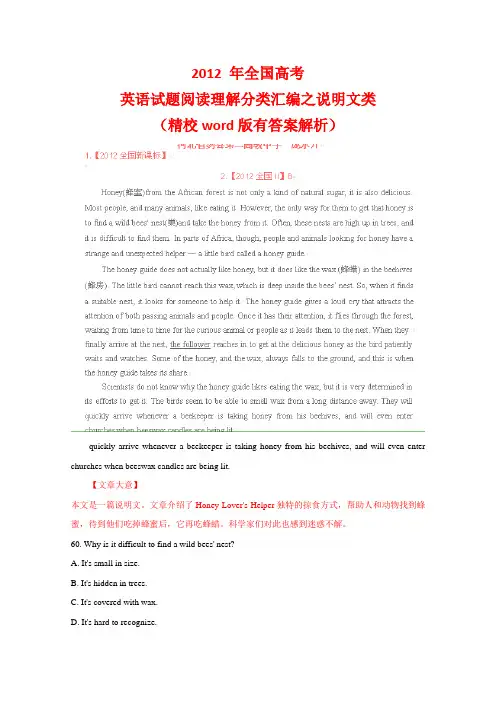
2012 年全国高考英语试题阅读理解分类汇编之说明文类(精校word版有答案解析)quickly arrive whenever a beekeeper is taking honey from his beehives, and will even enter churches when beeswax candles are being lit.【文章大意】本文是一篇说明文。
文章介绍了Honey-Lover's Helper独特的掠食方式,帮助人和动物找到蜂蜜,待到他们吃掉蜂蜜后,它再吃蜂蜡。
科学家们对此也感到迷惑不解。
60. Why is it difficult to find a wild bees' nest?A. It's small in size.B. It's hidden in trees.C. It's covered with wax.D. It's hard to recognize.【答案】B【解析】根据文章第一段“Often, these nests are high up in trees, and it is difficult to find them.”可知B正确。
【考点定位】考查细节理解。
61. What do the words "the follower" in Paragraph 2 refer to?A. A bee.B. A bird.C. A honey seeker.D. A beekeeper.【答案】C【解析】根据文章中“In parts of Africa, though, people and animals looking for honey have a strange and unexpected helper一a little bird called a honey guide.”可推知:跟在honey guide后面的是:people and animals,而他们统称为honey seeker(寻找蜂蜜的人或动物们)。
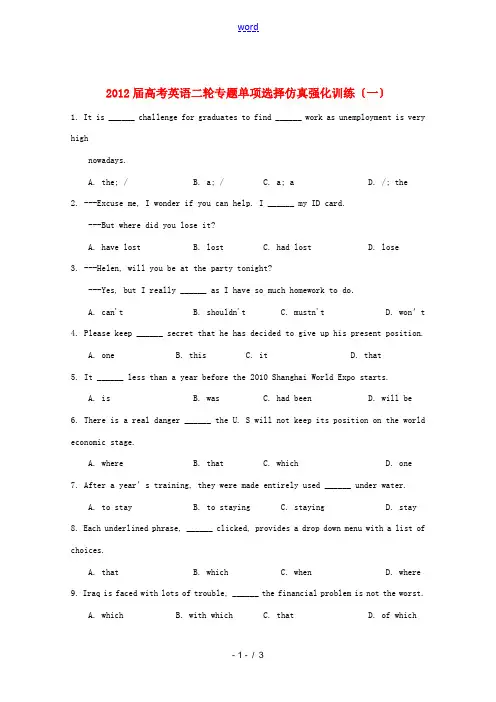
2012届高考英语二轮专题单项选择仿真强化训练〔一〕1. It is ______ challenge for graduates to find ______ work as unemployment is very highnowadays.A. the; /B. a; /C. a; aD. /; the2. ---Excuse me, I wonder if you can help. I ______ my ID card.---But where did you lose it?A. have lostB. lostC. had lostD. lose3. ---Helen, will you be at the party tonight?---Yes, but I really ______ as I have so much homework to do.A. can'tB. shouldn'tC. mustn'tD. won’t4. Please keep ______ secret that he has decided to give up his present position.A. oneB. thisC. itD. that5. It ______ less than a year before the 2010 Shanghai World Expo starts.A. isB. wasC. had beenD. will be6. There is a real danger ______ the U. S will not keep its position on the world economic stage.A. whereB. thatC. whichD. one7. After a year’s training, they were made entirely used ______ under water.A. to stayB. to stayingC. stayingD. stay8. Each underlined phrase, ______ clicked, provides a drop down menu with a list of choices.A. thatB. whichC. whenD. where9. Iraq is faced with lots of trouble, ______ the financial problem is not the worst.A. whichB. with whichC. thatD. of which10. I’ve heard that tune before, but I don’t know the words ______ the song.A. forB. toC. ofD. in11. Five of the 12 bronze animal heads ______ to China, with seven other ones still missing.A. returnedB. had returnedC. have been returnedD. have returned12. If you know ______ it was that wrote Gone with the wind, raise your hand.A. whomB. whichC. whoD. that13. The hospital nearby has just got a, ______ you’d call it, err... a scanner.A. thatB. whichC. howD. what14. We Chinese are drinking ______ milk per person today as we did in 1995.A. more than twiceB. twice as muchC. twice as many asD. twice as much as15. His brother gave him a long-distance call, ______ him to work as a volunteer recoveringvictims from the collapsed buildings.A. invitingB. invitedC. to inviteD. having invited答案1-5 BABCD 6-10 BBCDB 11-15 CCDB A解题技巧点评1.考查冠词。
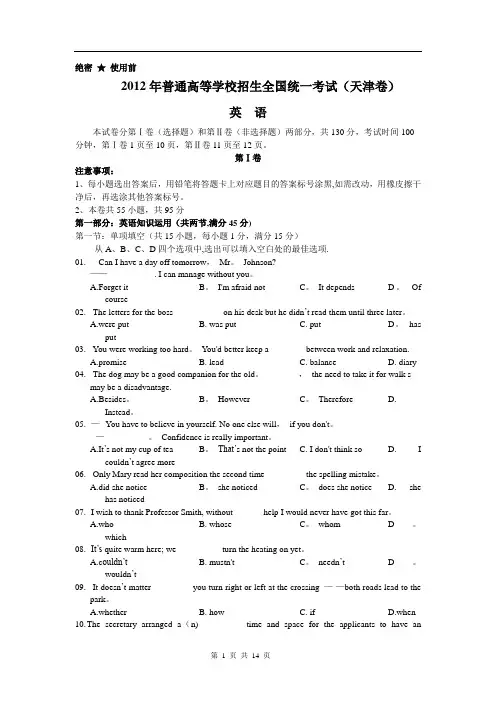
绝密★使用前2012年普通高等学校招生全国统一考试(天津卷)英语本试卷分第Ⅰ卷(选择题)和第Ⅱ卷(非选择题)两部分,共130分,考试时间100分钟,第Ⅰ卷1页至10页,第Ⅱ卷11页至12页。
第Ⅰ卷注意事项:1、每小题选出答案后,用铅笔将答题卡上对应题目的答案标号涂黑,如需改动,用橡皮擦干净后,再选涂其他答案标号。
2、本卷共55小题,共95分第一部分:英语知识运用(共两节,满分45分)第一节:单项填空(共15小题,每小题1分,满分15分)从A、B、C、D四个选项中,选出可以填入空白处的最佳选项.01.---Can I have a day off tomorrow,Mr。
Johnson?——-__________. I can manage without you。
A.F orget it B。
I'm afraid not C。
It depends D。
Ofcourse02.The letters for the boss___________ on his desk but he didn’t read them until three later。
A.w ere putB. was putC. put D。
hasput03.You were working too hard。
You'd better keep a ________between work and relaxation.A.p romiseB. leadC. balanceD. diary04.The dog may be a good companion for the old。
_______,the need to take it for walk smay be a disadvantage.A.B esides。
B。
However C。
Therefore D.Instead。
05.—--You have to believe in yourself. No one else will,if you don't。
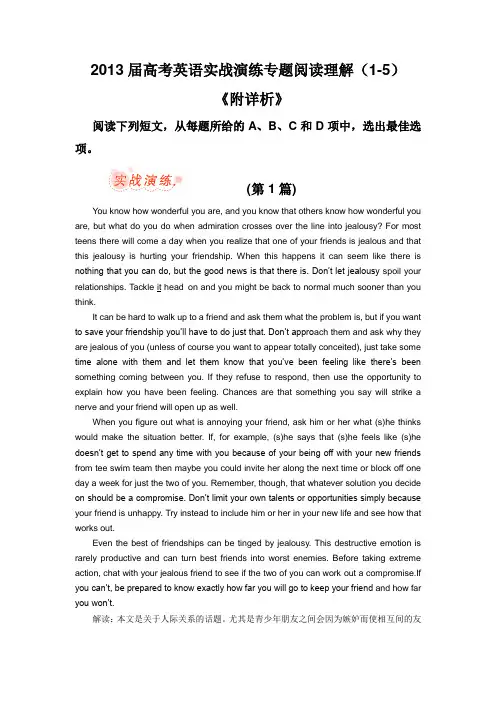
2013届高考英语实战演练专题阅读理解(1-5)《附详析》阅读下列短文,从每题所给的A、B、C和D项中,选出最佳选项。
(第1篇)You know how wonderful you are, and you know that others know how wonderful you are, but what do you do when admiration crosses over the line into jealousy? For most teens there will come a day when you realize that one of your friends is jealous and that this jealousy is hurting your friendship. When this happens it can seem like there is nothing that you can do, but the good news is that there is. Don’t let jealousy spoil your relationships. Tackle it head on and you might be back to normal much sooner than you think.It can be hard to walk up to a friend and ask them what the problem is, but if you want to save your friendship you’ll have to do just that. Don’t appro ach them and ask why they are jealous of you (unless of course you want to appear totally conceited), just take some time alone with them and let them know that you’ve been feeling like there’s been something coming between you. If they refuse to respond, then use the opportunity to explain how you have been feeling. Chances are that something you say will strike a nerve and your friend will open up as well.When you figure out what is annoying your friend, ask him or her what (s)he thinks would make the situation better. If, for example, (s)he says that (s)he feels like (s)he doesn’t get to spend any time with you because of your being off with your new friends from tee swim team then maybe you could invite her along the next time or block off one day a week for just the two of you. Remember, though, that whatever solution you decide on should be a compromise. Don’t limit your own talents or opportunities simply because your friend is unhappy. Try instead to include him or her in your new life and see how th at works out.Even the best of friendships can be tinged by jealousy. This destructive emotion is rarely productive and can turn best friends into worst enemies. Before taking extreme action, chat with your jealous friend to see if the two of you can work out a compromise.If you can’t, be prepared to know exactly how far you will go to keep your friend and how far you won’t.解读:本文是关于人际关系的话题。
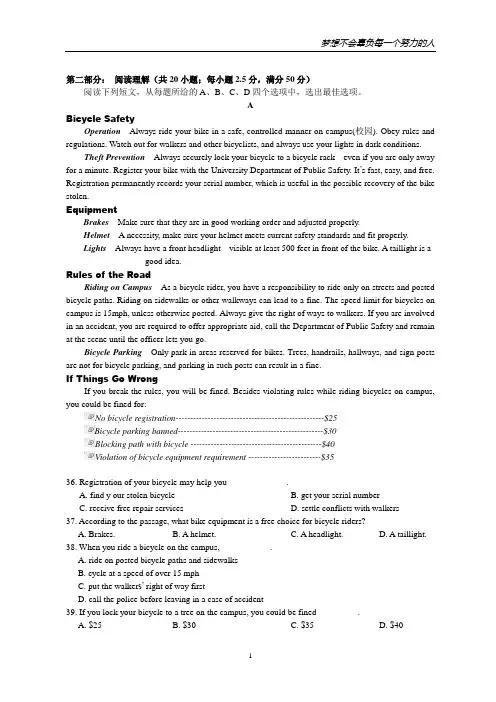
第二部分:阅读理解(共20小题;每小题2.5分,满分50分)阅读下列短文,从每题所给的A、B、C、D四个选项中,选出最佳选项。
ABicycle SafetyOperation Always ride your bike in a safe, controlled manner on campus(校园). Obey rules and regulations. Watch out for walkers and other bicyclists, and always use your lights in dark conditions.Theft Prevention Always securely lock your bicycle to a bicycle rack---even if you are only away for a minute. Register your bike with the University Department of Public Safety. It’s fast, easy, and free. Registration permanently records your serial number, which is useful in the possible recovery of the bike stolen.EquipmentBrakes Make sure that they are in good working order and adjusted properly.Helmet A necessity, make sure your helmet meets current safety standards and fit properly.Lights Always have a front headlight---visible at least 500 feet in front of the bike. A taillight is a good idea.Rules of the RoadRiding on Campus As a bicycle rider, you have a responsibility to ride only on streets and posted bicycle paths. Riding on sidewalks or other walkways can lead to a fine. The speed limit for bicycles on campus is 15mph, unless otherwise posted. Always give the right of ways to walkers. If you are involved in an accident, you are required to offer appropriate aid, call the Department of Public Safety and remain at the scene until the officer lets you go.Bicycle Parking Only park in areas reserved for bikes. Trees, handrails, hallways, and sign posts are not for bicycle parking, and parking in such posts can result in a fine.If Things Go WrongIf you break the rules, you will be fined. Besides violating rules while riding bicycles on campus, you could be fined for:No bicycle registration---------------------------------------------------$25Bicycle parking banned--------------------------------------------------$30Blocking path with bicycle ---------------------------------------------$40Violation of bicycle equipment requirement -------------------------$3536. Registration of your bicycle may help you _____________.A. find y our stolen bicycleB. get your serial numberC. receive free repair servicesD. settle conflicts with walkers37. According to the passage, what bike equipment is a free choice for bicycle riders?A. Brakes.B. A helmet.C. A headlight.D. A taillight.38. When you ride a bicycle on the campus, ___________.A. ride on posted bicycle paths and sidewalksB. cycle at a speed of over 15 mphC. put the walker s’ right of way firstD. call the police before leaving in a case of accident39. If you lock your bicycle to a tree on the campus, you could be fined _________.A. $25B. $30C. $35D. $4040. What is the passage mainly about?A. A guide for safe bicycling on campus.B. Directions for bicycle tour on campus.C. Regulations of bicycle race on campus.D. Rules for riding motor vehicles on campus.BBarditch High School decided to an All-School Reunion. Over 450 people came to the event. There were tours of the old school building and a picnic at Confederate Park. Several former teachers were on hands to tell stories about the old days. Ms. Mabel Yates, the English teacher for fifty years, was wheeled to the Park.Some eyes rolled and there were a few low groans(嘟囔声)when Ms.Yates was about to speak. Many started looking at their watches and coming up with excuses to be anywhere instead of preparing to listen to a lecture from and old woman who had few kind words for her students and made them work harder than all the other teachers combined.Then Ms. Yates started to speak:“I can’t tell you how pleased I am to be here. I haven’t seen many of you since your graduation, but I have followed your careers and enjoyed your victories as well as crying for your tragedies. I have a large collection of newspaper photographs of my students. Although I haven’t appeared in person, I have attended your college graduations, weddings and even the birth your children, in my imagination.”Ms. Yates paused and started crying a bit. Then she continued:“It was my belief that if I pushed you as hard as I could, some of you would succeed to please me and others would succeed to annoy me. Regardless of our motives, I can see that you have all been successful in you chosen path.”“There is no greater comfort for an educator than to see the end result of his or her years of work. You have all been a great source of pleasure and pride for me and I want you to know I love you all from the bottom of my heart.”There was a silence over the crowd for a few seconds and then someone started clapping. Tee clapping turned into cheering, then into a deafening roar(呼喊). Lawyers, truck drivers, bankers and models were rubbing their eyes or crying openly with no shame all because of the words from a long forgotten English teacher from their hometown.41. What activity was organized for the school reunion?A. Sightseeing in the park.B. A picnic on the school playground.C. Telling stories about past events.D. Graduates’ reports in the old building.42. What can be inferred from Paragraph 2?A. Some graduates were too busy to listen to Ms. Yates’ speech.B. Many graduates disliked Ms. Yates’ ways of teaching.C. Some people got tired from the reunion activities.D. Most people had little interest in the reunion.43. We can learn from Ms. Yates’ speech that she _____________.A. kept track of her students’ progressB. gave her students advice on their careersC. attended her students’ college graduationsD. went to her students’wedding ceremonies44. What was Ms.Yates’ belief in teaching teenagers?A. Teachers’ knowledge is the key to students’ achievements.B. Pressure on students from teachers should be reduced.C. Hard-pushed students are more likely to succeed.D. Students’ respect is the best reward for teachers.45. Which of the following can best describe Ms. Yates?A. Reliable and devoted.B. Tough and generous.C. Proud but patient.D. Strict but caring.CThe practice of students endlessly copying letters and sentences from a blackboard is a thing of the past. With the coming of new technologies like computers and smartphone, writing by hand has become something of nostalgic (怀旧的)skill. However, while today’s educators are using more and more technology in their teaching, many believe basic handwriting skills are still necessary for students to be successful---both in school and in life.Virginia Berninger, professor of educational psychology at the University of Washington, says it’s important to continue teaching handwriting and help children acquire the skill of writing by hand.Berninger and her colleagues conducted a study that looked at the ability of students to complete various writing tasks---both on a computer and by hand. The study, published in 2009, found that when writing with a pen and paper, participants wrote longer essays and more complete sentences and had a faster word production rate.In a more recent study, Berninger looked at what role spelling plays in a student’s writing skills and found that how well children spell is tied to know well they can write. “Spelling makes some of the thinking parts of the brain active which helps us access our vocabulary, word meaning and concepts. It is allowing our written language to connect with ideas.” Berninger said.Spelling helps students translate ideas into words in their mind first and then to transcribe(转换) “those words in the mind written symbols on paper or keyboard and screen,” the study said. Seeing the words in the “mind’s eye” helps children not only to turn their ideas into words, says Berninger, but also to spot(发现) spelling mistakes when they write the words down and to correct then over time.“In our computer age, some people believe that we don’t have to teach spelling because we have spell checks,” she said. “But until a child has a functional spelling ability of about a fifth grade level, they won’t have the knowledge to choose the correct spelling among the options given by the computer.”46. What makes writing by hand a thing of the past?A. The absence of blackboard in classroom.B. The use of new technologies in teaching.C. The lack of practice in handwriting.D. The popular use of smartphones.47. Berninger’s study published in 2009 ___________.A. focused on the difference between writing by hand and on a computer.B. indicated that students prefer to write with a pen and paper.C. found that good essays are made up of long sentences.D. discussed the importance of writing speed.48. Which of the following best shows the role of spelling?A. Spelling improves one’s memory of words.B. Spelling ability is closely related to writing ability.C. Spelling benefits the translation from words into ideas.D. Spelling slows down finding exact words to express ideas.49. What does “mind’s eye” in paragraph 5 mean?A. Window.B. SoulC. Picture.D. Imagination.50. What conclusion could be drawn from the passage?A. Computers can help people with their choice of words.B. Spell checks can take the place of spelling teaching.C. Handwriting still has a place in today’s classrooms.D. Functional spelling ability develops fast in the fifth grade.DYou are given many opportunities in life to choose to be a victim or creator. When you choose to be a victim, the world is a cold and difficult place. “They” did things to you which caused all of your pain and suffering. “They” are wrong and bad, and life is terrible as long as “they” are around. Or you may blame yourself for all your problems, thus internalizing(内化)your victimization. The truth is, your life is likely to stay that way as long as you feel a need to blame yourself or others.Those who choose to be creators look at life quite differently. They know there are individuals who might like to control their lives, but they don’t let this get in the way. They know they have their weaknesses, yet they don’t blame themselves when they fail. Whatever happens, they have choice in the matter. They believe their dance with each sacred(神圣的)moment of life is a gift and that storms are a natural part of life which can bring the rain needed for emotional and spiritual growth.Victims and creators live in the same physical world and deal with many of the same physical realities, yet their experience of life is worlds apart. Victims relish (沉溺)in anger, guilt, and other emotions that cause others---and even themselves---to feel like victims, too. Creators consciously choose love, inspiration, and other qualities which inspire not only themselves, but all around them. Both victims and creators always have choice to determine the direction of their lives.In reality, all of us play the victim or the creator at various points in our lives. One person, on losing a job or a special relationship, may feel as if it is the end of the world and sink into terrible suffering for months, years, or even a lifetime. Another with the same experience may choose to first experience the grief, then accept the loss and soon move on to be a powerful creative force in his life.In every moment and every circumstance, you can choose to have fuller, richer life by setting a clear intention to transform the victim within, and by inviting into your life the powerful creator that you are.51. What does the word “they” in Paragraph 1 probably refer to?A. People and things around you.B. Opportunities and problems.C. Creators and their choices.D. Victims and their sufferings.52. According to Paragraph 2, creators __________.A. seem willing to experience failures in lifeB. possess the ability to predict future lifeC. handle ups and downs of life wiselyD. have potential to create something new53. What can we learn from Paragraph 3?A. Creators and victims face quite different things in life.B. Creators and victims are masters of their lives.C. Victims can influence more people than creators.D. Compared with victims, creators are more emotional.54. The examples mentioned in Paragraph 4 show that _______________.A. strong attachment to sufferings in life pulls people into victims.B. people need family support to deal with challengers in life.C. it takes creators quite a long time to get rid of their pains.D. one’s experiences determine his attitude toward life.55. What is the author’s purpose in writing this passage?A. To define victims and creators.B. To evaluate victims against creators.C. To explain the relationship between victims and creators.D. To suggest the transformation from victims to creators.2012年普通高等学校招生全国统一考试(天津卷)英语笔试第Ⅱ卷注意事项:1.用黑色墨水的钢笔或签字笔将答案写在答题卡上。
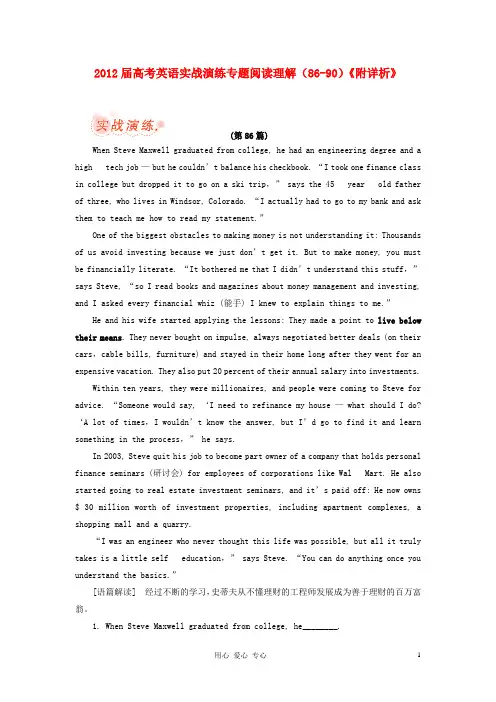
用心 爱心 专心 1 2012届高考英语实战演练专题阅读理解(86-90)《附详析》 (第86篇) When Steve Maxwell graduated from college, he had an engineering degree and a hightech job — but he couldn’t balance his checkbook. “I took one finance class in college but dropped it to go on a ski trip,” says the 45yearold father of three, who lives in Windsor, Colorado. “I actually had to go to my bank and ask them to teach me how to read my statement.” One of the biggest obstacles to making money is not understanding it: Thousands of us avoid investing because we just don’t get it. But to make money, you must be financially literate. “It bothered me that I didn’t understand this stuff,” says Steve, “so I read books and magazines about money management and investing, and I asked every financial whiz (能手) I knew to explain things to me.” He and his wife started applying the lessons: They made a point to live below their means. They never bought on impulse, always negotiated better deals (on their cars,cable bills, furniture) and stayed in their home long after they went for an expensive vacation. They also put 20 percent of their annual salary into investments. Within ten years, they were millionaires, and people were coming to Steve for advice. “Someone would say, ‘I need to refinance my house — what should I do? ‘A lot of times,I wouldn’t know the answer, but I’d go to find it and learn something in the process,” he says. In 2003, Steve quit his job to become part owner of a company that holds personal finance seminars (研讨会) for employees of corporations like WalMart. He also started going to real estate investment seminars, and it’s paid off: He now owns $ 30 million worth of investment properties, including apartment complexes, a shopping mall and a quarry. “I was an engineer who never thought this life was possible, but all it truly takes is a little selfeducation,” says Steve. “You can do anything once you understand the basics.” [语篇解读] 经过不断的学习,史蒂夫从不懂理财的工程师发展成为善于理财的百万富翁。 1. When Steve Maxwell graduated from college, he________. 用心 爱心 专心 2
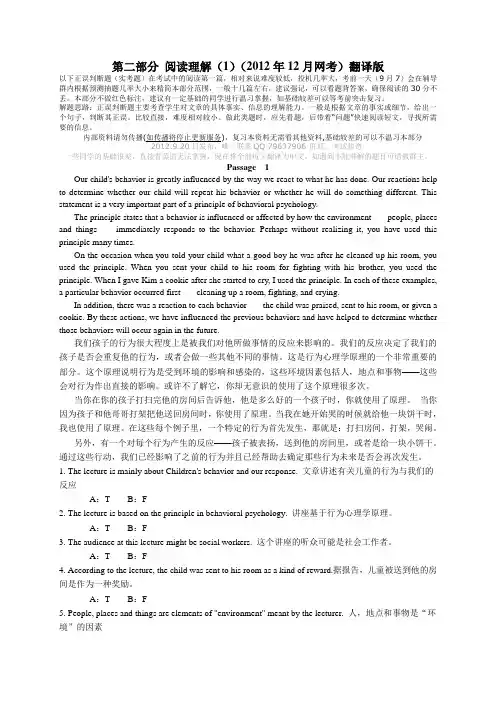
第二部分阅读理解(1)(2012年12月网考)翻译版以下正误判断题(实考题)在考试中的阅读第一篇,相对来说难度较低,投机几率大,考前一天(9月7)会在辅导群内根据预测抽题几率大小来精简本部分范围,一般十几篇左右,建议强记,可以看题背答案,确保阅读的30分不丢。
本部分不做红色标注,建议有一定基础的同学进行温习掌握,如基础较差可以等考前突击复习。
解题思路:正误判断题主要考查学生对文章的具体事实、信息的理解能力。
一般是根据文章的事实或细节,给出一个句子,判断其正误。
比较直接,难度相对较小。
做此类题时,应先看题,后带着“问题”快速阅读短文,寻找所需要的信息。
内部资料请勿传播(如传播将停止更新服务),复习本资料无需看其他资料,基础较差的可以不温习本部分2012.9.20日发布,唯一联系QQ 79637906 旺旺:考试传奇一些同学的基础很差,直接看英语无法掌握,现在将全部短文翻译为中文,如遇到不能理解的题目可请教群主。
Passage 1Our child's behavior is greatly influenced by the way we react to what he has done. Our reactions help to determine whether our child will repeat his behavior or whether he will do something different. This statement is a very important part of a principle of behavioral psychology.The principle states that a behavior is influenced or affected by how the environment ---- people, places and things ---- immediately responds to the behavior. Perhaps without realizing it, you have used this principle many times.On the occasion when you told your child what a good boy he was after he cleaned up his room, you used the principle. When you sent your child to his room for fighting with his brother, you used the principle. When I gave Kim a cookie after she started to cry, I used the principle. In each of these examples, a particular behavior occurred first ---- cleaning up a room, fighting, and crying.In addition, there was a reaction to each behavior ---- the child was praised, sent to his room, or given a cookie. By these actions, we have influenced the previous behaviors and have helped to determine whether those behaviors will occur again in the future.我们孩子的行为很大程度上是被我们对他所做事情的反应来影响的。

2012 届高考英语阅读理解训练(9(一)Toyota Motor Corp, Japan?s biggest carmaker, said on Friday it will recall 1,489 Lexus sedans 高(级轿车 sold in China. "It will take us some time to ship the fuel tanks and vent pipes to China to change those in these Lexus sedans for customers free of charge, if problems are found," said Yang Hongjian, a spokeswoman- of Toyota?s China representative office.The expected recall will affect Lexus LS430 sedans made in Japan from July 29, 2003 to January 14, 2004, the representative office said in a statement. Toyota has not received complaints from Chinese customers, according to the statement. The move will be part of Toyota?s global recall of 18,200 Lexus LS430s. It will be the third car recall in China in two weeks. Although automobile recall is a common practice in developed markets, it remains new to Chinese customers. The Chinese government published long-awaited automobile recall rules on March 15, which will be officially carried out at the beginning of October.China?s auto market si forecast to reach 10 million units by 2010. Automakers, especially Chinese producers, will face greater pressure from automobile recalls, which could be very costly sometimes, and should be in full preparations, according to the expert. The Japanese carmaker sold 1, 549 Lexus vehicles on the Chinese mainland during the first five months of this year, according to Yang. Lexus sales on the mainland reached 4,000 units last year, up from 1,600 units in 2002. (China Daily July 3, 20041. What can we learn from the text?A. Chinese customers are not satisfied with Toyota Lexus LS430 sedans.B. Chinese car market has seen car recalls three times so far.C. Toyota will have a worldwide recall of Lexus LS430 sedans.D. Toyota Motor start to recall Lexus Sedans due to the problems with fuel tanks.2.The carmakers were unwilling to recall their cars in the past mainly because ______.A. they were not fully preparedB. they couldn?t afford the cost for their car recallsC. their products could not meet the required standardD. there were no related rules and little pressure3. It is implied in the passage that ______.A. sales of homemade automobiles will grow even fasterB. automobile recalls will take place in China more frequentlyC. China?s car market is forecasto be the biggest by 2010 in the worldD. Toyota is likely to sell the most Lexus Sedans in China in the future4.Which of the following is the best tide of this passage?A. Toyota to Recall Its Lexus Sedans Sold in ChinaB. China Prepares to Recall CarsC. The Problems in China?s Car MarketD. Costly Japanese Car Recalls(二)The A-level question Have 22 continuous years of rises in A-level pass rate made the exam worthless? David Miliband, the minister for School Standards, insists the answer is a firm " no". And he said it was wrong that " more will mean worse and more education for more people will mean lower standards". Figures show that— despite the rise in A-grades to 21. 6 per cent— only 22,000 out of 600,000 18-year-olds gain three A-grade passes. Put another way, that means— in a primary class of 30 pupils — only one will get three A-grades. The center right Bow Group, in a pamphlet published today, however, says nine out of ten scholars believe A-grades have been devalued over the past ten years.Two inquiries (检查— both set up by the Government?s exams watchdogs one—of which included independent teaching experts, refused to accept that there had been any "dumping down" of A-level standards. But while they conclude that the exam questions have not become easier, changes in examining methods have almost certainly made it easier to gain top-grade passes.As a result of the exams shake-up introduced in 2000, students sit six differenttypes of exams to make up an A-level during the course of their two years of study. Only 20 per cent of the marks are set for the end-of-term exam. This makes it easier for teachers to help their pupils with the right answers.Mr Miliband said yesterday, " My argument is not that to day ,s generation of pupils are cleverer than their parents; it is that schools and teachers are getting better atgetting the best out of them. "5.From the writer?s point of view, the rise in A-grades to 21. 6 per cent shows______.A. it is generally thought more education means lower standardsB. the rise in the A-level pass rate has made the exam worthlessC. the quality of the 18-year-olds has become lowerD. it is still hard for the general pupils to get three A-grade passes6. The underlined word " they" in the second paragraph refers to ______.A. the exams watchdogsB. the independent teaching expertsC. the A-level standardsD. the two inquiries7.As a result of the exams shake-up introduced in 2000 ______.A. the pass rate for A-levels was set to rise continuouslyB. the exam became easier than it had been before 2000C. pupils could have many more choices of test after 2000D. it soon became popular with teachers and pupils8. What does this passage mainly discuss?A. How reliable and effective the A-level grading system is.B. How the A-level system helps universities select pupils.C. How the pass rate has been increased in recent years.D. How the A-level grading system has changed over the years.(三)We have all experienced days when everything goes wrong. A day may begin well enough, but suddenly everything seems to get out of control. It seems as if a single unimportant event may cause a number of things to happen. Let us suppose that you are preparing a meal and keeping an eye on the baby at the same time. The telephone ringsand this means your troubles are beginning. While you are on the phone, the baby pulls the table-cloth off the table, destroying your prepared meal. You hang up hurriedly and attend to your baby. Meanwhile, the meal gets burnt. As if these were not enough tobring you to tears, your husband arrives unexpectedly bringing three guests to dinner.Things can go wrong on-a number of people on the road. During the rush hour one evening, two cars hit each other and both drivers began to argue. The woman driver behind the two cars happened to be a learner. She suddenly went into a panic and stopped her car. This made the driverfollowing her stop suddenly. His wife was sitting beside him holding a large cake. As she was thrown forward, the cake went right through the window and landed on the road?. Seeing a cake-flying through the air, a truck driver had to stop his truck all of a sudden. The truck was carrying empty beer bottles and hundreds of them slid off the back of the truck and fell onto the road. This led to yet another angry argument. Meanwhile, the traffic piled up behind. It took the police nearly an hour to get the traffic to move again. In the meanwhile, the truck driver had to sweep up hundreds of broken bottles. Only two dogs were enjoying themselves from the accident; for they were happily having what was leftof the cake. It was just one of those days.9. What does the writer mainly tell us?A. Troubles always happen at the same time.B. Everyone may have trouble every day.C. A small matter can cause great trouble.D. Only the lucky man won?t have any trouble every day.10. According to the passage, what should be the correct order?(1 The woman driver stopped her car suddenly.(2 The driver?s wife dropped her cake on the road.(3 Only two dogs were happy.(4 Two cars hit each other.(5 The truck driver had to sweep up hundreds of broken bottles.A. (2(3(3(5(1B. (4(1(2(5(3C. (3(5(2(4(1D. (1(4(2(3(511. Which of the following is true?A. The woman?s husband brought three guests home to dinner unexpectedly.B. The meal got burnt.C. Her baby pulled the table-cloth off the table.D. It is not strange to experience such accidents.12.What does the word "these" in the last sentence of the first paragraph refer to?A. Your husband brings three guests to dinner unexpectedly.B. The meal gets burnt.C. The baby pulls the table-cloth off the table.D. Both B and C.【答案与分析】1. C 细节题。
2012年普通高等学校招生全国统一考试英语绝密启用前本试卷分第Ⅰ卷(选择题)和第Ⅱ卷(非选择题)两部分。
第Ⅰ卷1至14页。
第Ⅱ卷15至16页。
考试结束后,将本试卷和答题卡一并交回。
第Ⅰ卷注意事项:1.答题前,考生在答题卡上务必用直径0.5毫米黑色墨水签字笔将目己的姓名、准考证号填写清楚,并贴好条形码。
请认真核准条形码上的准考证号、姓名和科目。
2.短小题选出答案后,用2B铅笔把答题卡上对应题目的答案标号涂黑,如需改动,用橡皮擦干净后,再选涂其他答案标号,在试题卷上作答无效。
第一部分听力(共两节,满分30分)做题时,先将答案标在试卷上。
录音内容结束后,你将有两分钟的时间将试卷上的答案转涂到答题卡上。
第一节(共5小题:每小题1.5分,满分7.5分)听下面5段对话。
每段对话后有一个小脱.从题中所给的A.B.C三个选项中选出最佳选项,并标在试卷的相应位置。
听完每段对话后,你都有10秒钟的时间来回答有关小题和阅读下一小题。
每段对话仅读一遍。
例:How much is the shirt?A.£19.15.B.£9.15.C.£9.18.答案是B。
1.Where does this conversation probably take place?A.In a bookstore.B.In a classroom.C.In a library.2.At what time will the film begin?A.7:20B.7:15C.7:003.What are the two speakers mainly talking about?A.Their friend Jane.B.A weekend trip.C.A radio programme.4.What will the woman probably do?A.Catch a train.B.See the man off.C.Go shopping.5.Why did the woman apologize?A.She made a late delivery.B.She went to the wrong place.C.She couldn't take the cake back.第二节(共15小题;每小题1.5分,满分22.5分)听下面5段对话。
一、2012高考英语写作专练及范文1 水资源缺乏主题:水资源缺乏1. Directions: For this part, you are allowed 30 minutes to write a composition on the topic On Water Shortage. You should write at least 150 words, and base your composition on the outline given below:1. Water shortage is becoming an urgent problem2. Possible reasons3. Possible solutionsOn Water ShortageNo one can have failed to notice the fact that water shortage is a grave problem with which the whole world is confronted. Actually, it has become so widespread t hat it has severely affected people’s daily life and hindered the development of the global economy.A number of factors could account for the problem, but the following might be the critical ones. First, with the development of agriculture and industry, an increasing amount of water is needed. Secondly, the ever-increasing population is another leading cause of water shortage. Besides, the global tendency of warming up also contributes to the problem. What’s worse, pollution and waste of fresh water aggrav ate the situation.In view of the seriousness of the problem, effective measures must be taken before things get worse. First, it is essential that laws and regulations be worked out and enforced to protect water resources. Secondly, people should enhance their awareness of saving water. With these measures taken, it is reasonable for us to expect a brighter future.二、2012高考英语写作专练及范文2 互联网主题:互联网People's Use of the Internet1. 上图所示为2001年7月、2002年7月、2003年1月我国上网用户总人数,请描述其变化;2. 请说明发生这些变化的原因;3.你认为目前用户在因特网使用中有什么困难或问题。
- 1 - 2012届高考英语实战演练专题阅读理解(1__40) 1 阅读下列短文,从每题所给的A、B、C和D项中,选出最佳选项。 You know how wonderful you are, and you know that others know how wonderful you are, but what do you do when admiration crosses over the line into jealousy? For most teens there will come a day when you realize that one of your friends is jealous and that this jealousy is hurting your friendship. When this happens it can seem like there is nothing that you can do, but the good news is that there is. Don‟t let jealousy spoil your relationships. Tackle it head on and you might be back to normal much sooner than you think. It can be hard to walk up to a friend and ask them what the problem is, but if you want to save your friendship you‟ll have to do just that. Don‟t approach them and ask why they are jealous of you (unless of course you want to appear totally conceited), just take some time alone with them and let them know that you‟ve been feeling like there‟s been something coming between you. If they refuse to respond, then use the opportunity to explain how you have been feeling. Chances are that something you say will strike a nerve and your friend will open up as well. When you figure out what is annoying your friend, ask him or her what (s)he thinks would make the situation better. If, for example, (s)he says that (s)he feels like (s)he doesn‟t get to spend any time with you because of your being off with your new friends from tee swim team then maybe you could invite her along the next time or block off one day a week for just the two of you. Remember, though, that whatever solution you decide on should be a compromise. Don‟t limit your own talents or opportunities simply because your friend is unhappy. Try instead to include him or her in your new life and see how that works out. Even the best of friendships can be tinged by jealousy. This destructive emotion is rarely productive and can turn best friends into worst enemies. Before taking extreme action, chat with your jealous friend to see if the two of you can work out a compromise.If you can‟t, be prepared to know exactly how far you will go to keep your friend and how far you won‟t. 1. According to the author, the jealousy emotion is________. A. normal B. productive C. destructive D. extreme 2. Which of the following is NOT mentioned as a way to confront your friend when jealousy happens? A. Walking up to him/her and asking him/her why he/she is jealous of you. B. Walking up to him/her and asking him/her what the problem is. C. Spending some time with him/her and letting him/her know how you feel. D. Spending some time with him/her and letting him/her know you think there‟s something between you. 3. The underlined “it” in the first paragraph refers to________. A. friendship B. relationship C. admiration D. jealousy 4. What can be inferred from the last two paragraphs? A. There‟s always a solution to solve the problem of jealousy. B. Jealousy can turn best friends into worst enemies. C. You may lose a friend to keep your own gifts, chances or self development. D. You should go a long way with your friend to work out a solution 5. The purpose of the passage is________. A. to explain what causes jealousy B. to offer some advice on making friends C. to introduce the way to cope with a jealous friend D. to explain how destructive the jealous emotion is 2 Do American children still learn handwriting in school? In the age of the keyboard, some people seem to think handwriting lessons are on the way out. 90% of teachers say they are required to teach handwriting.But studies have yet to answer the question of how well they are teaching it. One study published this year found that about three out of every four teachers say they are not prepared to teach handwriting. Some teachers are teaching handwriting by providing instruction for 10 ___15 minutes a day, and then other teachers who basically teach it for 60 to 70 minutes a day — which really for handwriting is pretty much. Many adults remember learning that way — by copying letters over and over again. Today‟ s thinking is that short periods of practice are better. Many experts also think handwriting should not be taught by itself. Instead, they say it should be used as a way to get students to express ideas. After all, that is why we write. Handwriting involves two skills. One is legibility,_which means forming the letters so they can be read. The other is fluency — writing without having to think about it. Fluency continues to develop up until high school. But not everyone masters these skills. Teachers commonly report that about onefourth of their kids have poor handwriting. Some people might think handwriting is not important any more because of computers and voice recognition programs. But Steve Graham at Vanderbilt says word processing is rarely done in elementary school, especially in the early years. American children traditionally first learn to print, and then to write in cursive, which connects the letters. But guess what we learned from a spokeswoman for the College Board, which administers the SAT college admission test. More than 75 percent of students choose to print their essay on the test rather than write in cursive. 1.We can learn ________ from Paragraph 1. A. teaching handwriting is a basic requirement in teaching job B. most teachers prefer to teach handwriting C. teachers spend little time in teaching handwriting D. a keyboard has taken the place of the handwriting entire 2.Which of the following is WRONG for traditional handwriting in the USA? A. The students are taught by practicing a long period. B. The letters are repeated many times. C. Handwriting includes two skills. D. To write in cursive is taught first. 3.The underlined word “legibility” in Paragraph 3 means ________. A. easy to read B. complex C. unexpected D. unreadable 4.The best title for the passage is ________. A. How to improve handwriting in school B. Right or wrong: the death of handwriting C. Handwriting involves two skills D. Handwriting lessons are on the way out 5.The author‟ s attitude towards whether still to learn handwriting in school is________. A. negative B. objective C. critical D. optimistic